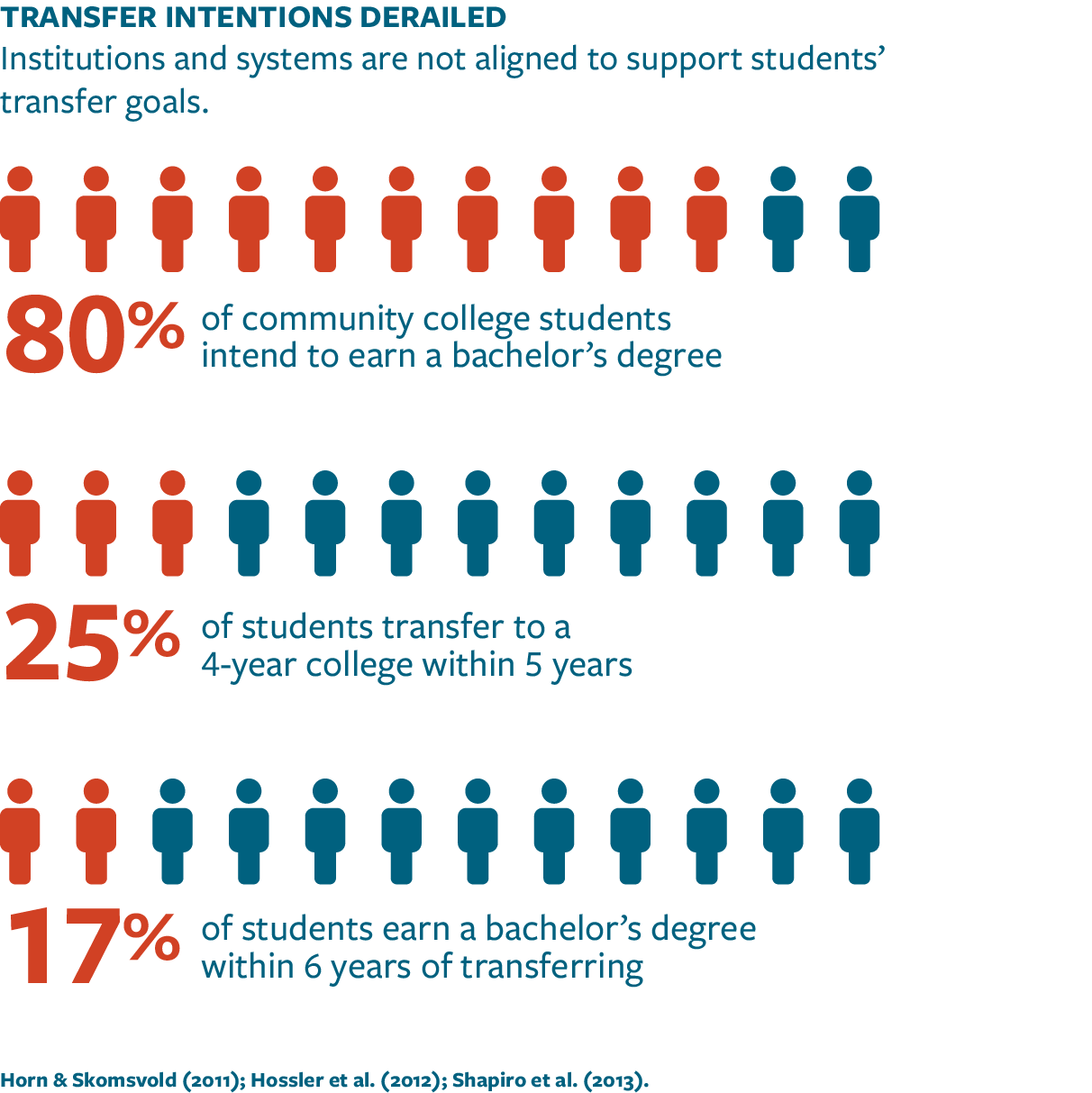
How We See the Problem
Leveraging workforce training, transferring between postsecondary providers and entering or re-entering the workforce are pivotal moments in a learner’s career or academic journey. Institutions and systems can implement policies and practices that inadvertently make these transitions difficult. For example, when curricula don’t align, or information systems are incapable of sharing data effectively, students risk losing credits, momentum and money. The jump from postsecondary education into the workforce also presents challenges, especially when institutions offer programming that does not align with the skills employers need.

Our Three Investment Priorities
Grants to Streamline Key Learner Transitions
College Promise Careers Institute, Promise Regional Convenings, & Expanding Ecosystems for Promise Student Support
Scaling
This grant supports the College Promise Campaign (CPC) in providing professional development and technical assistance to new and existing Promise programs by hosting regional workshops and its fourth annual College Promise Careers Institute. CPC will also expand work focused on developing career pathways for Promise students in high-growth labor market segments.
Exploring Geographic Isolation as a Barrier to Equitable Transfer Outcomes
Exploration
This grant supports the RP Group in assessing the role of proximity to four-year institutions in the transfer outcomes of low-income and Latinx students in California in order to identify ways to strengthen transfer policy and practice, particularly in states with large rural areas not well served by broad access four-year institutions.
Actualizing Community Vibrancy Metrics
Exploration
This grant supports Achieving the Dream (ATD) in helping its member colleges collect and use learner- and community-level data to drive college-wide reform. ATD will pilot the use of its new Community Vibrancy metrics framework with 15 colleges, learning how the metrics can be applied to drive change and produce tools and a training curriculum to support broader adoption across ATD’s 300+ member institutions.
Community College Growth Engine Fund Expansion
Exploration
This grant supports Education Design Lab (The Lab) in deploying the Community College Growth Engine Fund with two community college systems. The Lab will support the design and pilot of employer-validated micro-pathways to connect low-income learners to economic mobility.
Community Colleges as Apprenticeship Intermediaries: Learning What Works
Exploration
This grant supports New America Foundation in exploring the role of apprenticeship intermediaries. New America will conduct research to identify effective community college apprenticeship intermediaries and offer policy and practice recommendations for community colleges to scale this strategy.
Expansion of the Good Jobs Project
Validation
This grant supports the Georgetown University Center on Education and the Workforce in mapping economic opportunity by identifying where good jobs exist in urban and rural regions and establishing the most reliable educational and training pathways to those jobs. This analysis will expand on existing research by contextualizing opportunities to locale and enabling education and workforce providers to align programs with existing and projected labor demand.
Hana Career Pathways in Healthcare
Exploration
This grant supports the University of Hawaii System (UH) in developing articulated career pathways that lead from high-demand, entry-level healthcare occupations to advancement in skills, education, career and earnings. UH will develop clear career pathways and institutionalize the necessary policies and data infrastructure that provide opportunities for learners to transition from non-credit job training to credit-based degrees by leveraging apprenticeships and stackable industry-valued credentials.
Building Stackable Credential Pipelines that Support Equity and Provide Pathways
Validation
This grant supports The RAND Corporation in examining stackable credential pipelines in two states to determine whether learners from low-income backgrounds benefit from stackable credentials, whether they face barriers in accessing these pathways and which institutional and system level policies and programs strengthen equity. The goal is to inform efforts within the two states and nationally to build effective and equitable stackable credential pipelines for learners from low-income backgrounds.
Michigan Community College Workforce and Transfer Alignment
Scaling
This grant supports the Michigan Community College Association in improving equitable access to and through community college workforce programs for low-income learners statewide by improving program alignment with industry certifications, building new baccalaureate transfer pathways with universities and strengthening advising practices related to both transfer and career outcomes.
Advancing Outcomes Research on Postsecondary Competency-Based Education Pathways
Exploration
This grant supports American Institutes for Research in developing a typology of competency-based education program design features. They will also develop an evaluation plan using the typology to research the impact of key design features and outcomes for learners from low-income backgrounds.


